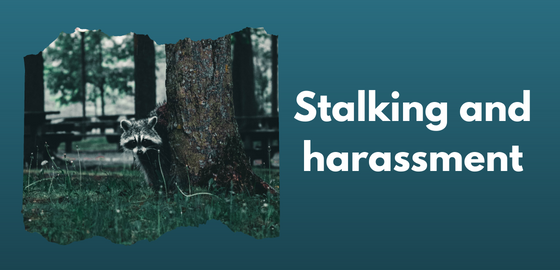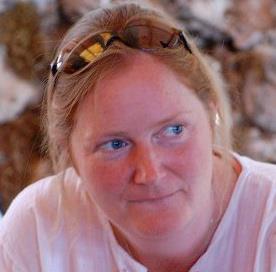Supporting victims of stalking and harassment has always been a major part of our mission at Aurora New Dawn. Here we explain what stalking is and how, alongside organisations like the police, we support people who have been (or are still being) subjected to stalking.
Stalking is a serious criminal offence – and yet it is something that is so often missed or ignored. For the victim, stalking brings with it fear, anxiety and enormous danger; so, why are stalking conviction rates still so low?
According to findings from the Crime Survey for England and Wales, in the year ending March 2020 there were estimated to be over 25,000 adult stalking victims. However, information from the Suzy Lamplugh Trust puts the number of stalking incidents in the year 2019-2020 as being at 1.5 million, with a conviction rate of just 0.1%.
While there are many factors coming into play here, we do believe that a lack of real understanding around what constitutes stalking is a key influencer. It’s something that we want to change, and fast.
What is stalking?
We describe stalking as the ‘imposition of a relationship where one would not otherwise exist’, but really, this barely scratches the surface. Stalking is a pattern of fixation, obsession, unwanted and repeated behaviour that can leave a victim feeling defenceless, distressed and in constant fear. While stalking will often come in the form of intimate partner stalking (from a perpetrator who has previously been in a relationship with the victim) research from the Suzy Lamplugh Trust shows that approximately half of all stalking cases did not include an ex-intimate partner, and we would attest with that in our own work with stalking victims. That is why a specialist stalking service outside of generic domestic abuse provision is essential.
Stalking can come in many forms such as:
- Phone calls
- Emails
- Unwanted gifts
- Unwanted communication
- Damaging property
- Threats
- Repeatedly following or spying
- Using fake profiles to communicate
- Contacting friends, family or work colleagues
The list goes on and – in isolation – the acts may not appear to have much impact. However, repeated over and over across long periods of time and in culmination with one another, they quickly become frightening and very serious. Psychologist and leading expert in stalking, Lorraine Sheridan, explains that stalking is really about the motivation for the behaviour rather than the behaviour itself. In many cases, it involves the targeted repetition of otherwise ordinary or routine acts.
Why is there a lack of understanding around stalking?
Stalking can be incredibly hard to unpick, especially when there can be so many additional complications such as if you have children or own a home with the perpetrator. In these instances, a couple will need to communicate and often be in the same space, so it can be harder to separate what is and isn’t stalking, for the victim and for other people around them. In these situations, we also find perpetrators can try to manipulate the criminal system to get access to their victim; for example, often a stalker will take their victim through family court on repeated occasions simply to make contact and see them face to face.
‘We often find that professionals struggle to draw the line between what is and isn’t stalking. We tend to see this when they have been working with a victim and perpetrator for a long time and they can’t quite tell when that escalation becomes ‘too much’. Because we are immersed in this world day in and day out, we can tell pretty much immediately – even when the case isn’t an obvious instance of stalking – that the line has been crossed and action is needed,’ says Brianne, Independent Stalking Advocacy Caseworker at Aurora.
Victims of stalking need long term support outside of the Criminal Justice System, otherwise responsibility falls to police officers who have to navigate stalking scenarios without professional support from trained experts, Within a constantly changing environment, this has led to clients not being referred to the right place (if at all) and the emotional, impartial support for victims being amiss. This experience is frightening, incredibly stressful for victims and is compounded by the lack of awareness around the reality of stalking in society. We often see it romanticised in television, literature and film, and perpetrators themselves either shift the act of stalking under a gaslighting lens or hold onto the excuse that ‘they did it because they cared’.
These narratives need a drastic rewrite, and we work closely with people and organisations looking to lead this change. In January 2022 we were featured as part of the Stacey Dooley BBC documentary on stalking which you can watch here, and we recently signed the super complaint submitted by The Suzy Lamplugh Trust on the police response to stalking.
Aurora and Thames Valley Police | A union supporting victims of stalking
Having provided stalking advocacy services in Hampshire and the Isle of Wight since 2013, we were delighted that earlier this year, Aurora started working in collaboration with Thames Valley Police to provide Independent Stalking Advocacy Caseworker support to victims of stalking offences in the area. This union – running until March 2025 – enables us to work with victims and professionals to ensure that everyone gets the best support possible, to minimise high risk scenarios and remove victims from dangerous situations quickly and safely.
Most of the referrals come directly from Thames Valley Constabulary – however, as the service grows the team imagines more and more will be self referrals. Whatever the route, it’s our job to support victims and the police throughout the entire criminal journey and beyond.
‘Our approach is to ask ‘why is this NOT an example of stalking?’ It’s a subtle shift but one that we are trying to embed within all the professionals that we work with. If we can’t answer that question, then we must all move forward with the understanding that this IS a case of stalking,’ says Brianne.
And the service is already proving a success with both the police force and clients alike, and is a vital source of victim support where previously there had been nothing similar.
What next for Aurora and Thames Valley Police?
The team is busy planning different training opportunities and sessions to run across Thames Valley in the new year which will further support professionals so that they can better support victims of stalking through improved awareness and understanding alongside the service itself.
The entire collaboration is yet another example of the many ways that Aurora unites with like-minded and value-led organisations, all with a shared mission of enhancing trauma informed work with victims and survivors. We are focused on getting people onto the right path and standing against those who choose to abuse, harrass and stalk, because the onus needs to be placed on them and victims deserve justice and to live their lives free from the physical and psychological harm that stalkers cause.
If you would like to support the Aurora New Dawn charity and you are able to donate you can do so here:
If you would like to support our female only group work and you are able to donate you can do so here:
Next step…
Do you want to get in touch with us?
Want to help us raise awareness?
Want to donate to our cause? 💜




